
Egyptian Journal of Biological Pest Control
metrics 2024
Championing open-access research for a pest-free future.
Introduction
The Egyptian Journal of Biological Pest Control, published by SPRINGER, is a premier open-access journal dedicated to advancing the field of biological pest management. With its ISSN 1110-1768 and E-ISSN 2536-9342, this journal has established a reputation for disseminating high-quality research since its inception in 2008. Its commitment to open access since 2018 enhances its accessibility, making vital research available to a global audience. The journal boasts impressive Scopus rankings, including a Q1 classification in Agronomy and Crop Science and Insect Science for 2023, demonstrating its significant influence in the realms of ecological and agricultural research. The journal serves as an essential platform for researchers, professionals, and students interested in sustainable pest control strategies, focusing on the integration of biological methods within conventional agricultural practices. Based in Egypt, it plays a crucial role in addressing both regional and global challenges in pest management, affirming its importance in the scientific community.
Metrics 2024
 0.63
0.63 2.10
2.10 2.30
2.30 29
29Metrics History
Rank 2024
Scopus
IF (Web Of Science)
JCI (Web Of Science)
Quartile History
Similar Journals

PHYTOPARASITICA
Unveiling the Secrets of Plant-Parasitic Interactions.PHYTOPARASITICA, published by SPRINGER in the Netherlands, is a distinguished journal dedicated to the fields of Insect Science and Plant Science. With an impressive convergence of research from 1973 to 2024, the journal holds a notable position in academic circles, ranking in Q2 for both categories as of 2023, according to Scopus metrics. This places PHYTOPARASITICA within the top 67th percentile for Insect Science and the 59th percentile for Plant Science, reflecting its significant impact on research and advancements in these crucial fields. The journal is committed to disseminating high-quality, peer-reviewed research that addresses the interplay between plants and their parasitic organisms, contributing to the broader understanding of agricultural sustainability and ecological balance. Researchers, professionals, and students will find this journal an essential resource for cutting-edge insights and developments within its domain.
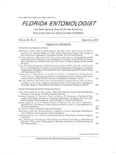
FLORIDA ENTOMOLOGIST
Transforming Insect Science for a Sustainable FutureFLORIDA ENTOMOLOGIST is a prestigious peer-reviewed journal dedicated to the advancement of entomological sciences, published by Walter de Gruyter GmbH. Since its transition to open access in 1994, the journal has become a vital resource for researchers, students, and professionals in the fields of Insect Science and Ecology, Evolution, Behavior, and Systematics. With an impact factor ranking high in its category—Q2 in Insect Science and Q3 in Ecology, Evolution, Behavior and Systematics—the journal showcases significant findings and contributions that shape our understanding of insect biology and its implications for ecological systems. The journal is indexed in Scopus, further establishing its relevance, with current rankings reflecting its competitive standing within Agricultural and Biological Sciences. Published continuously since 1982, FLORIDA ENTOMOLOGIST not only facilitates the dissemination of knowledge among entomologists but also encourages interdisciplinary collaboration, making it an essential publication for anyone invested in the scientific study of insects.

JOURNAL OF NEMATOLOGY
Advancing the Science of Nematodes for Sustainable AgricultureJOURNAL OF NEMATOLOGY, published by the SOC NEMATOLOGISTS, serves as a crucial platform for cutting-edge research in the fields of nematology, agronomy, and crop science. With an ISSN of 0022-300X and an E-ISSN of 2640-396X, this esteemed journal has been an open-access resource since 2016, enabling a wider audience to engage with its findings. The journal is recognized for its high-quality publications, currently holding a Q2 ranking in Agronomy and Crop Science as per the 2023 category quartiles. With a Scopus rank of #171 out of 406 in Agricultural and Biological Sciences, it occupies a vital position in disseminating knowledge crucial for advancing research and practices related to nematodes and their impact on crop productivity. The JOURNAL OF NEMATOLOGY aims to foster collaboration among researchers, professionals, and students, ultimately contributing to the sustainability and productivity of agricultural systems.
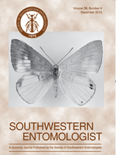
SOUTHWESTERN ENTOMOLOGIST
Fostering Collaboration in Insect Research and EcologySOUTHWESTERN ENTOMOLOGIST is a pivotal academic journal dedicated to advancing the fields of Agronomy, Ecology, and Insect Science. Published by the SOUTHWESTERN ENTOMOLOGICAL SOC in the United States, this journal plays a crucial role in disseminating vital research findings that address pressing ecological and agricultural challenges. With its ISSN 0147-1724 and E-ISSN 2162-2647, the journal has been publishing comprehensive studies since 1993 and continues to contribute significantly to the knowledge base up to 2024. As a Q4 ranked journal in both Agronomy and Crop Science and Ecology, as well as Insect Science, it provides an inclusive platform for researchers and students to share their insights and foster collaborations. Although it currently does not offer open access options, the content is accessible to academic institutions and professionals, ensuring that significant findings reach a broad audience. Given its niche focus, SOUTHWESTERN ENTOMOLOGIST not only appeals to researchers and students but also to professionals looking to stay updated on the latest trends and developments in entomology and its related fields.
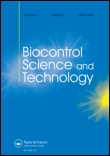
BIOCONTROL SCIENCE AND TECHNOLOGY
Driving Excellence in Biocontrol Research and TechnologyBIOCONTROL SCIENCE AND TECHNOLOGY is a premier, peer-reviewed journal published by Taylor & Francis Ltd that specializes in the dynamic fields of Agronomy and Insect Science. Established in 1991, this journal has garnered a reputation for disseminating high-quality, impactful research with an impressive 2023 Scopus rank of 53 out of 181 in Insect Science and 153 out of 406 in Agronomy, placing it in the Q2 category for both fields. With its ISSN 0958-3157 and E-ISSN 1360-0478, the journal serves as a vital resource for researchers, professionals, and students dedicated to advancing understanding and innovation in pest management and biocontrol strategies. Although not an open-access journal, it offers comprehensive insights that are crucial for professionals aiming to tackle agricultural challenges and enhance food security. The journal’s continuous coverage from 1991 to 2024 ensures that it remains at the forefront of significant advancements in biocontrol, making it an essential read for anyone interested in sustainable agricultural practices and integrated pest management.
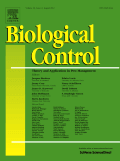
BIOLOGICAL CONTROL
Pioneering Research in Biological Pest ControlBIOLOGICAL CONTROL, published by Academic Press Inc Elsevier Science, is a prestigious journal focusing on the advancement of knowledge in the field of biological pest control and integrated pest management. With a high-impact factor reflecting its significant contributions to agronomy and insect science, it has secured elite positions in both Q1 categories as of 2023. The journal ranks within the top 6% and 12% of its fields on Scopus, making it an essential resource for researchers and professionals dedicated to sustainable agricultural practices and ecological balance. With its comprehensive exploration of theoretical and applied studies from 1991 to 2024, BIOLOGICAL CONTROL serves as a critical platform for disseminating innovative research and promoting dialogue among scholars, students, and practitioners. Although the journal follows a subscription-based access model, it consistently attracts contributions that shape the future of pest management strategies.

INDIAN JOURNAL OF AGRICULTURAL SCIENCES
Empowering research to enhance food security.Welcome to the Indian Journal of Agricultural Sciences, a vital resource for researchers and professionals in the field of agricultural sciences, published by the esteemed Indian Council of Agricultural Research. Established in 1974, this journal aims to disseminate high-quality research and developments in agronomy and crop science, facilitating knowledge exchange and advancement within the agricultural community. Though currently classified in the Q4 category according to 2023 data, it provides an essential platform for publication, contributing valuable insights towards sustainable agricultural practices. With an ISSN of 0019-5022 and an E-ISSN of 2394-3319, the journal houses important research that spans decades of convergence and collaboration, promoting innovation in agriculture across India and beyond. As an open access platform, it invites contributions that reflect a wide array of agricultural disciplines to foster sustainable food systems that address the challenges of food security. Join the network of scholars and practitioners by sharing your research and engaging with the profound work being done in this transformative field.
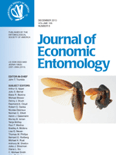
JOURNAL OF ECONOMIC ENTOMOLOGY
Elevating Knowledge in Economic Entomology and BeyondJOURNAL OF ECONOMIC ENTOMOLOGY, published by OXFORD UNIV PRESS INC, stands as a premier interdisciplinary platform for researchers and professionals in the realms of entomology and ecological sciences. With a robust publication history dating back to 1945, this esteemed journal has consistently maintained its reputation for disseminating high-quality research, as evidenced by its prestigious Q1 rankings in both Ecology and Insect Science for 2023. The journal’s impact is highlighted by its excellent Scopus ranks, placing it in the top percentile of Agricultural and Biological Sciences and Environmental Science categories. Aimed at advancing the understanding of insects and their relationships with humans and ecosystems, the JOURNAL OF ECONOMIC ENTOMOLOGY offers a critical forum for original research articles, reviews, and opinion pieces that influence practices in pest management, conservation, and agricultural productivity. Although not an Open Access journal, its findings are pivotal for students, researchers, and professionals striving to address contemporary challenges in entomology and beyond.

Pesquisa Agropecuaria Tropical
Unlocking insights for global agricultural progress.pesquisa Agropecuaria Tropical is a premier Open Access journal dedicated to advancing the knowledge and practices within the field of agronomy and crop science. Since its inception in 1971, this peer-reviewed journal, published by the Universidade Federal de Goiás, has played a pivotal role in disseminating high-quality research from Brazil and beyond. Operating under an Open Access model, it ensures that scholarly articles are freely accessible, thereby fostering greater collaboration and innovation. With a Scopus ranking placing it in the 32nd percentile among its peers in agricultural and biological sciences, and a current classification in the Q3 category of agronomy and crop science, the journal serves as an essential resource for researchers, professionals, and students alike. As it continues its publication journey from 2010 to 2024, it remains committed to contributing valuable insights and advancements in the agricultural sector, ultimately influencing sustainable practices and food security.

JOURNAL OF STORED PRODUCTS RESEARCH
Championing Research for a Sustainable FutureJOURNAL OF STORED PRODUCTS RESEARCH, published by PERGAMON-ELSEVIER SCIENCE LTD, is a leading academic journal in the fields of Agronomy and Crop Science, Food Science, Horticulture, and Insect Science. With ISSN 0022-474X and E-ISSN 1879-1212, this journal has been a cornerstone of research since its inception in 1965 and continues to contribute valuable insights into the science of stored products through its rigorous peer-reviewed articles. Recognized in 2023 with top rankings in various categories (Q1 in Agronomy and Crop Science, and Horticulture; Q2 in Food Science), its commitment to addressing the challenges in the preservation and quality of stored products is reflected in its substantial impact factor and robust Scopus rankings. Although it does not operate under Open Access, the journal remains crucial for professionals and researchers seeking to advance their understanding and application of stored product science. Located in the United Kingdom, at The Boulevard, Langford Lane, Kidlington, Oxford OX5 1GB, England, the journal stands as a pivotal resource for those committed to enhancing agricultural sustainability and food security.